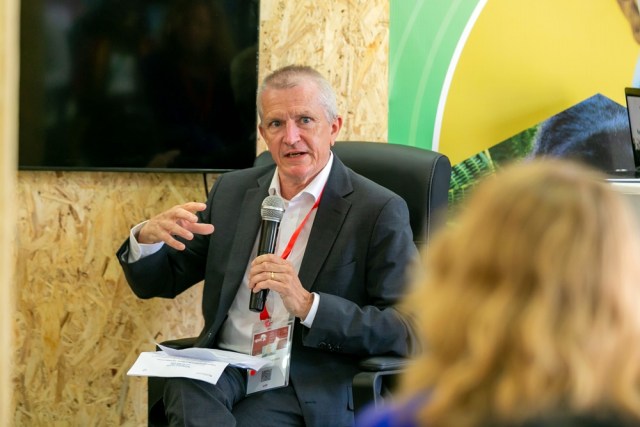APAC 2022: How the operationalization of One Health concept in conservation Improves Wildlife, Human Development and Rwanda’s Economy

Rwanda's Minister of Health, Dr Ngamije Daniel speaking at the IUCN One Health Event
BY JUSTIN KAYIRANGA
As part of the African Protected Areas Congress, on Thursday, 21 July 2022, the International Union for Conservation of Nature (IUCN) with generous support from the German Federal Ministry for the Environment, Nature Conservation, Nuclear Safety and Consumer Protection (BMUV) has organizing One Health events under APAC which facilitated interactions, discussions, networking, partnering, and sharing of best-practices between key stakeholders, among them are governments, NGOs, donors, specialists, researchers, practitioners, local communities, etc.
According to Rwanda’s Minister of Health Dr. Daniel Ngamije, while delivering his keynote address at the One Health High Level Dialogue taking place alongside the ongoing IUCN African Protected Areas Congress, he said: “I am glad that Health was put at the Centre of the discussions and that the One Health approach’s potential to promote connection between nature and people is a key topic today.
He said that “Rwanda has prioritized healthy people in a healthy environment. Efforts to conserve, protect and restore the environment are not only done to cope with climate change, but also to ensure human health, livestock, agriculture and biodiversity.”
Minister Ngamije added that “Health and environment are two sides of a coin that are interlinked and interdependent. We have developed a One Health Policy, One Health Strategic Plan and currently a group of experts from various sectors is developing One Health Operational Plan.”
“This gathering provides us with an opportunity to reflect on and appreciate the linkages between Human health, biodiversity, and Environment as well as the need for shared responsibility towards integrated and holistic planning, policies and investments” he said.
Speaking to the media shortly after the session, Uwingeri Prosper, the manager of Volcanoes National Park said that during the session on one health, “we have looked at combining different categories that have to do with human and animal health. We have also looked at how the small area of the Volcanoes National Park and the lack of free space create problems that threaten human health and wildlife.”
“But also, when we talk about issues, we also talk about the long journey we have taken, where we came from 50 years ago; people used to cut down the park’s forest, kill animals, but now because of the park’s value it has reached its economic, social and national value.
This shows that it is time to bring together different sections of the national life in order to be united in the same vision of animal conservation, and conservation of human life, because animal and park life have something in common with human life.” Uwingeri said.
“Conserving the environment and human life enables us to have people, to have a country, to have a sustainable economy.” He explained
“We can say that although the park has been severely damaged by agriculture or poachers, tourism has had a positive impact on the well-being of the people living in the park.”
Uwingeri further added that the damage to Volcanoes National Park has been greatly reduced.
“Compared to the last 15 or 20 years now it has dropped by about 85%. So, you see that in those years we were destroying thousands of traps, now we have less than 500 traps, and that is a good thing.” He revealed
“So, you can see the role the tourism revenue-sharing program has played an important role, and has brought in partnerships with these people who were doing these illegal activities, especially the former poachers.” Said Uwingeri.
German environment minister Steffi Lemke said that for decades, environmental protection, especially biodiversity conservation, was seen as something that would simply be nice to have.
However, actually the opposite is true: “A healthy environment is vital for human health and well-being and for a resilient economy and society. Healthy ecosystems are our foundations of life”, she said.

She added that preserving them is therefore an absolute must. The COVID-19 pandemic has brought this into the public eye once again. It has highlighted how closely human health is connected to the health of animals and ecosystems.
Stewart Maginnis, IUCN Deputy Director General explained that biodiversity supports human health in many ways, including through the delivery of basic goods and services, sustained by well-functioning ecosystems.
He added that on health, biodiversity is integral to key development sectors that modulate health outcomes directly or indirectly, such as forestry, fisheries, agriculture, and tourism, on which an estimated 1.5 billion people depend for their livelihoods.

One Health is now widely recognized that a multi-sectoral and interdisciplinary approach, considering people, animals (both wild as well as domesticated) and environment, is required to enhance human health and to reduce the risk (occurrence and impact) of future pandemics.


















